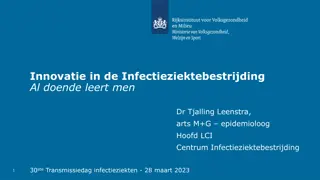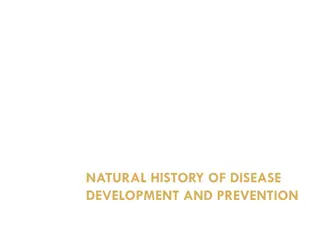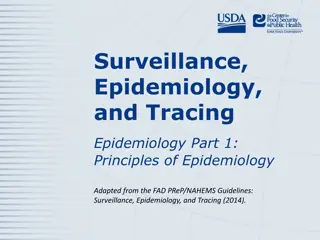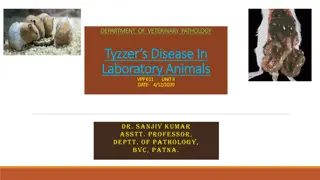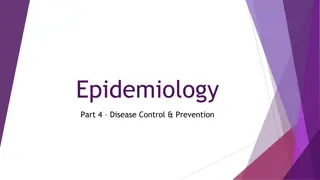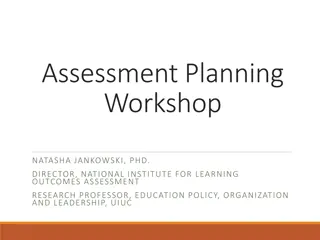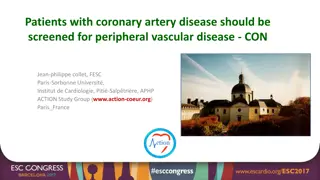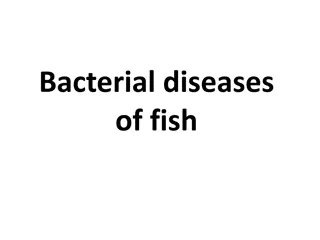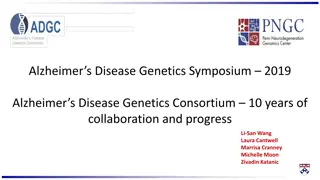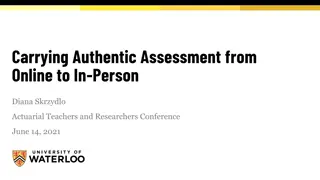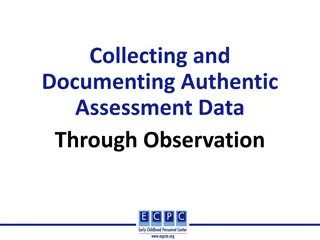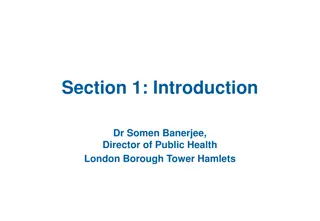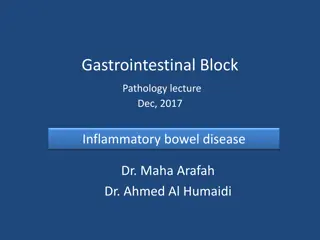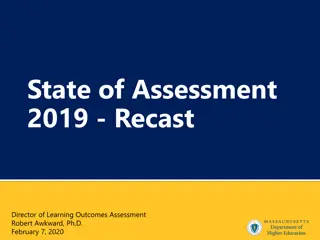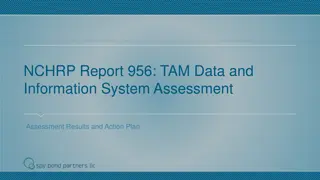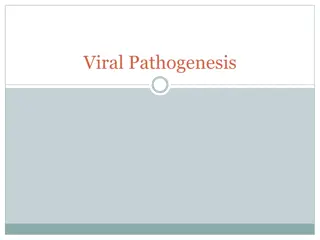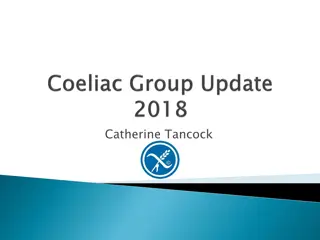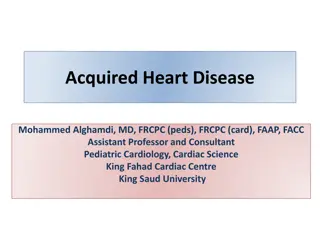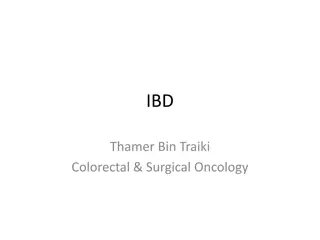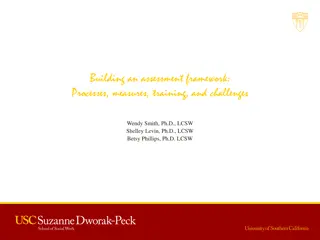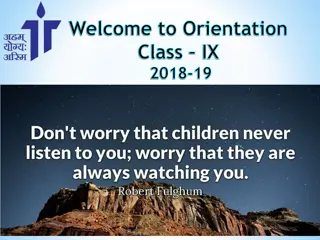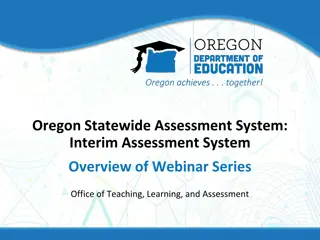Innovations in Infectious Disease Control: Insights from Experts
Explore the latest advancements in infectious disease control through the lens of renowned epidemiologists and researchers. Delve into the impact of the COVID-19 pandemic, the historical prevalence of infectious diseases, and early infection prevention practices. Uncover the evolution of infectious
0 views • 22 slides
The Natural History of Disease Development and Prevention
The natural history of disease development outlines the progression of a disease in an individual without intervention, from exposure to outcome. Learning objectives include defining prevention terms, understanding disease severity, prevention levels, and intervention measures. Studying disease prog
4 views • 16 slides
Sheffield Early Help Assessment Form Update and Integration with Extended Support Plan
Sheffield has introduced an updated Early Help Assessment form to streamline the assessment process within the Early Help System. This new form combines the Early Help Assessment with the Extended Support Plan, aligning various assessment tools and referral forms into one comprehensive document. The
6 views • 22 slides
Enhancing Language Learning Through Peer Assessment
Explore the benefits of peer assessment as a valuable tool for language learning, comparing it with self-assessment. Discover the components and challenges of self-assessment, along with the potential of peer assessment to improve accuracy and promote self-regulation. Gain insights into what peer as
4 views • 29 slides
Overview of DSW End Point Assessment Team Leader Level 3
DSW End Point Assessment Team Leader Level 3 provides a clear understanding of the assessment process, ensuring individuals comprehend why and when it occurs, responsibilities involved, and how DSW supports them. It covers topics such as what End Point Assessment entails, assessment design and deliv
2 views • 18 slides
Principles of Epidemiology: Understanding Disease Occurrence and Surveillance
Epidemiology is the study of disease patterns, factors influencing disease occurrence, and the core functions of surveillance, field investigation, and analytic studies. It involves understanding disease characteristics, natural history, and evaluating the effectiveness of activities to mitigate dis
1 views • 25 slides
Insights into Tyzzer's Disease: An Overview of a Bacterial Infection in Laboratory Animals
Tyzzer's disease is an acute bacterial infection affecting rodents and rabbits, caused by Clostridium piliforme. Discovered in 1917 by Ernest Tyzzer, the disease is characterized by necrotic lesions in the caecal mucosa, liver, and heart. Initially known as Bacillus piliformis, it was later renamed
2 views • 21 slides
Disease Control and Prevention in Epidemiology
This article discusses disease control processes in epidemiology, including reducing disease incidence, duration, and transmission. It covers public policy interventions, elimination, eradication, and extinction of infectious agents. It also highlights preventable causes of disease and different lev
2 views • 10 slides
Assessment in Medical Education
Exploring the concepts of assessment in medical education, including defining assessment, types of assessment, reliability, validity, and aligning assessment methods with intended learning outcomes. The importance of constructive alignment and the impact of assessment on learning outcomes are also d
1 views • 12 slides
Assessment Matters in Sociology: Enhancing Learning Through Evaluation
Explore the significance of assessment in sociology education, focusing on key questions to evaluate current assessment procedures, review individual course assessments, and develop strategies to enhance student learning outcomes. Delve into the centrality of assessment in the learning process, with
2 views • 15 slides
Insights into Managing Assessment in the Classroom by Assessment Research Group
Explore the importance of standards and assessment in education through the lens of the Assessment Research Group. Gain valuable perspectives on curriculum delivery, understanding the assessment system, learner assumptions, task parameters, and more. Discover how language, structure, and agency play
3 views • 25 slides
Workshop on Assessment Planning by Dr. Natasha Jankowski
Dr. Natasha Jankowski, Director of the National Institute for Learning Outcomes Assessment, conducts a workshop focusing on effective use of assessment data to enhance undergraduate education. The workshop covers areas like evaluating assessment plans, program learning outcomes, and assessment rubri
1 views • 30 slides
Enhancing Understanding through Assessment in Educational Design Workshop
Learn and collaborate on assessment practices in education design at the "Understanding by Design Assessment Focus" workshop. The agenda includes sessions on summative and formative assessment, feedback, reporting, and more. Engage in activities like generating questions, finding destination partner
2 views • 76 slides
Institutional Assessment Planning Workshop Feedback and Insights
Feedback and insights from a recent institutional assessment planning workshop led by Dr. Mark Nicholas at FSU S. Warren Conference Center & Inn. Participants provided feedback on the usefulness of the content, presenter knowledge, ability to develop assessment plans, post-training assessment knowle
2 views • 9 slides
Screening for Peripheral Vascular Disease in Patients with Coronary Artery Disease
Patients with coronary artery disease should be screened for peripheral vascular disease as it is a frequent integrator of global cardiovascular risk. The association of atherosclerosis in various arterial diseases highlights the importance of identifying multisite artery disease. The prevalence and
0 views • 23 slides
Higher Education Assessment: The Complete Guide
Higher education assessment involves a systematic process of collecting, reviewing, and utilizing information to improve student learning and development. This guide covers the assessment cycle, learning outcomes, the mission behind assessment in higher education, what assessment is and is not, reas
1 views • 36 slides
Human Disease Symptom Network: Understanding Disease Relationships Through Symptoms and Genes
The Human Disease Symptom Network (HSDN) is constructed using a large-scale medical bibliographic records database to form a network of human diseases based on symptom similarities. By integrating disease-gene associations and protein-protein interaction data, correlations between symptom similarity
1 views • 37 slides
Gift Assessment Process at University of Washington
The Gift Assessment Process at University of Washington involves applying a 5% assessment to select current-use gifts over $1,000 and under $5 million. This assessment supports the university's advancement efforts and institutional priorities by transferring 5% of eligible contributions to the Provo
1 views • 5 slides
Overview of Environmental Impact Assessment and Strategic Environmental Assessment Directives
Environmental Impact Assessment (EIA) and Strategic Environmental Assessment (SEA) play crucial roles in evaluating the impact of planned activities on the environment. This content delves into the concept, origins, development, and key elements of environmental assessment, discussing the legal fram
2 views • 35 slides
Bacterial Diseases of Fish: Columnaris Disease Overview
Columnaris disease, also known as Saddleback disease, is a common bacterial infection in fish that is often brought about by poor handling and high stress levels. This disease manifests as tail and fin rot, leading to rapid fish mortality. The causative organism, Cytophaga (formerly Flexibacter), is
0 views • 21 slides
Institutional Assessment and Effectiveness Workshop Achievements at SUNY Oneonta
The Office of Institutional Assessment and Effectiveness at SUNY Oneonta has made significant progress in developing assessment protocols and processes, leading to a culture of assessment. This includes completing planning and assessment cycles, establishing objectives and procedures, and aligning u
2 views • 16 slides
Oregon Department of Education Assessment and Accountability Resources
Access important information on assessments, accountability, and reporting from the Oregon Department of Education. Find resources on updating assessment records, accessing student scores, and staying informed about assessment requirements for the 2023-24 academic year. Explore links for assessment
0 views • 55 slides
Oregon Department of Education - Assessment Resources and Updates
Explore the Assessment Record Updating Application (ARUA), Accountability Warehouse Extract (AWE), Secure Assessment Reports, and other important tools and information provided by the Oregon Department of Education for assessment data owners, analysts, and partners. Access links for assessment admin
1 views • 54 slides
Decoding Genetics: Insights from Alzheimer's Disease Symposium to Type 2 Diabetes Study
Explore the latest findings from the Alzheimer's Disease Genetics Symposium 2019 on disease mechanisms, drug targets, and genetic pathways. Dive into the progress made by the Alzheimer's Disease Genetics Consortium over the past decade. Transition to a Genome-Wide Association Study uncovering suscep
0 views • 42 slides
Enhancing Teaching Assessment for Actuarial Education
Exploring the transition of assessment practices from online to in-person settings, this presentation by Diana Skrzydlo at the Actuarial Teachers and Researchers Conference delves into the purpose of assessment, key principles, and activities for effective evaluation. Discover insights on diagnostic
0 views • 10 slides
Authentic Assessment through Systematic Observation: Best Practices
Explore the process of authentic assessment through systematic observation in early childhood education. Learn about collecting, documenting, and interpreting assessment data using evidence-based practices and technology. Discover the importance of working collaboratively with families and professio
1 views • 53 slides
Liver Disease Burden in Tower Hamlets
Dr. Somen Banerjee, Director of Public Health in London Borough Tower Hamlets, highlights the concerning liver disease mortality rates in the area, with high incidence of cirrhosis, cancer, and hepatitis B and C. The data reveals a significant burden of liver diseases such as Non-Alcoholic Fatty Liv
0 views • 18 slides
Inflammatory Bowel Disease: Crohn's Disease and Ulcerative Colitis
Inflammatory Bowel Disease (IBD) encompasses Crohn's disease (CD) and ulcerative colitis (UC), chronic conditions with immunologic basis. This article delves into the epidemiology, pathophysiology, and differences between CD and UC, highlighting clinical features, pathology, and complications like a
0 views • 42 slides
Ultrastructural Alterations of Renal Tissue in a Male Patient with Fabry's Disease
Fabry's disease is a rare X-linked lipid storage disorder characterized by deficient lysosomal alpha-galactosidase A activity. This condition primarily affects males, leading to chronic kidney disease and progression to end-stage renal disease. Kidney involvement is a critical aspect, and high doses
0 views • 24 slides
Assessment Practices in Higher Education Institutions
Dive into the state of assessment for the year 2019, featuring insights on hosting assessment days, establishment of assessment committees, implementation of institutional and program learning outcomes, appointment of a Director of Assessment, compensation for faculty members focusing on assessment,
0 views • 8 slides
NCHRP Report 956 TAM Data and Information System Assessment
This content provides an overview of NCHRP Report 956 focusing on the TAM data and information system assessment results and action plan. It includes details on assessment outcomes, recommendations, implementation action plans, and tools for self-assessment and improvement methodology. The content a
0 views • 21 slides
Viral Pathogenesis: Causes and Consequences
Viral pathogenesis involves the process by which a virus leads to disease, exploring the interplay between viral and host factors. It encompasses the concepts of virulence, viral disease, and the effects on infected cells and the host's immune response. Changes within infected cells, including cell
0 views • 26 slides
Exploring the History and Evolution of Coeliac Disease
Samuel Gee's pivotal clinical description of coeliac disease in 1887 unraveled a chain of discoveries leading to the understanding of its genetic and immunological roots. Early connections between wheat and the disease shed light on the domestication of wheat and its impact on human health. Recent i
0 views • 23 slides
Acquired Heart Disease
Acquired heart disease in children, including rheumatic fever and Kawasaki disease, is crucial for pediatric cardiologists to diagnose and treat effectively. Rheumatic fever, often precipitated by Group A Streptococcal pharyngitis, can lead to rheumatic heart disease if not recognized promptly. Reco
0 views • 36 slides
Understanding Inflammatory Bowel Disease (IBD) and Crohn's Disease
Inflammatory bowel disease (IBD) encompasses conditions like ulcerative colitis and Crohn's disease, with distinguishing factors based on clinical and pathologic criteria. Crohn's disease is a chronic inflammatory condition affecting the gastrointestinal tract with both medical and surgical treatmen
0 views • 51 slides
National Assessment System Recommendations - Schools' Own Assessments
The Task Group on Assessment and Testing report recommended a mix of moderated teachers' ratings and standardized assessment tasks for a national assessment system. The role of teachers in providing final reports to parents was emphasized. The evolution of national assessment tasks and the importanc
0 views • 24 slides
Building an Assessment Framework: Processes, Measures, Training
Constructing a comprehensive assessment framework involves establishing goals, developing assessment tools, analyzing results, and addressing challenges. Key principles include enabling assessment over time, holistic curriculum assessment, and engaging faculty in the assessment process. The framewor
0 views • 14 slides
Overview of New CBSE Assessment System for Class IX 2018-19
The orientation class for Class IX in the academic year 2018-19 introduces a new assessment and examination system by CBSE. The system is based on pen and paper tests at the end of the term, eliminating the semester system. It includes internal assessment components like periodic tests, notebook sub
0 views • 19 slides
Mathematics Assessment Workshop at University of Stockholm
Engage in a two-day workshop at the University of Stockholm focusing on enhancing mathematics assessment in vocational education. Join experts from Freudenthal Institute, Cito, and Utrecht University to discover new developments in computer-based assessment and national standard setting. Learn about
0 views • 4 slides
Oregon Statewide Assessment System: Interim Assessment Webinar Series
The Oregon Statewide Assessment webinar series aims to enhance teaching and learning systems through a balanced assessment approach. Educators and administrators will develop assessment literacy and improve outcomes for all learners by utilizing formative, interim, and summative assessments. The ser
0 views • 4 slides
